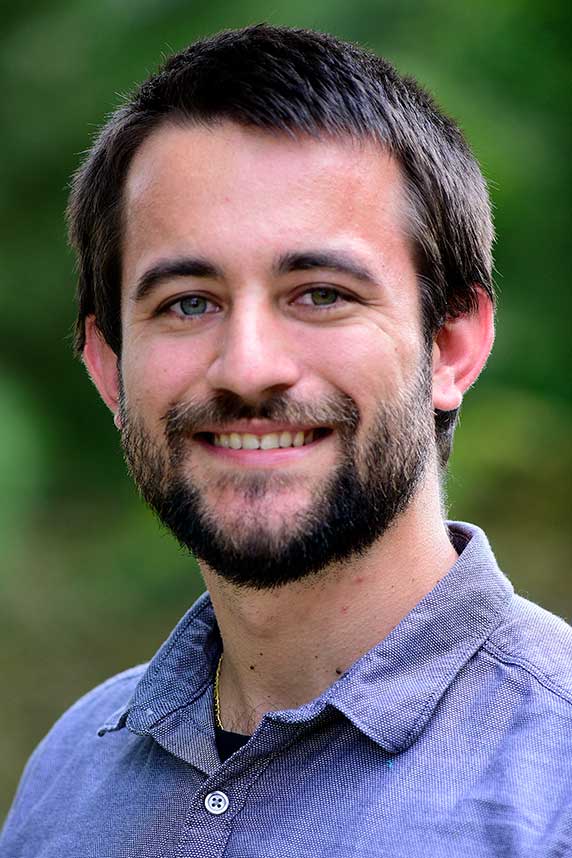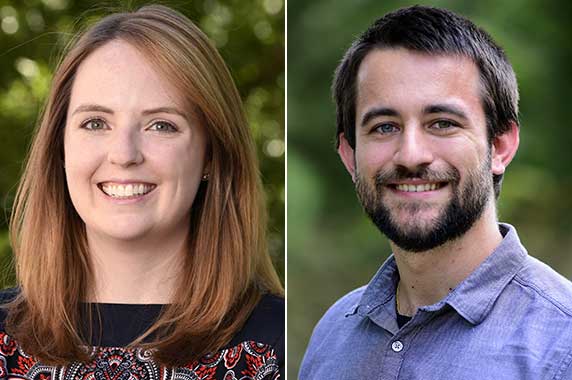NIEHS postdoctoral fellows Danielle Stevens, Ph.D., and Ciro Amato, Ph.D., have been awarded National Institutes of Health Pathway to Independence Awards. The research grants, also known as K99/R00 funding, have helped many fellows boost their careers and transition from mentored researcher positions to independent tenure track or equivalent faculty positions.
“We are very proud of Danielle and Ciro,” said Mercedes Arana, Ph.D., who directs the Office of Fellows Career Development (OFCD). “The Pathway to Independence Award is a prestigious prize, and Danielle and Ciro are most deserving.”
Stevens and Amato received their awards in April. They will receive both mentored and independent research support as part of the award.
Examining early life exposures to phthalates
Uncovering the role that early life environmental and nutritional exposures play in the development of cardiometabolic and respiratory disorders is the focus of Stevens’ research.
“With a growing number of American youths having at least one cardiometabolic abnormality, such as obesity, there is a critical need to identify intervenable risk factors,” said Stevens.
The grant will allow her to further study the role that a pregnant woman’s exposure to phthalates plays in her baby’s development. Phthalates are a group of chemicals used to make plastics more durable and are found in a variety of consumer and personal care products.
Stevens will use data from a prospective pregnancy cohort, the Human Placenta and Phthalates Study, to determine the effects of phthalates and phthalate alternatives on cardiovascular and metabolism development. She is working with collaborators at the Eastern Virginia Medical School to analyze fetal organ measures collected from pregnancy ultrasounds.
“Danielle has a keen mind for identifying important data gaps and for coming up with novel methodologies to address them,” said Kelly Ferguson, Ph.D., who leads the Perinatal and Early Life Epidemiology Group and is Stevens’ mentor. “With this work, she will be able to shed light on a lot of unanswered questions pertaining to fetal growth in pregnancy, and her training plan will position her well to be a leader in environmental and reproductive epidemiology.”
Pinpointing origin of birth defects
Amato’s work in the Reproductive Developmental Biology Group focuses on understanding the developmental origins of penile birth defects. He specifically studies hypospadias, a condition in which the urethra does not close all the way to the tip of the penis but exits somewhere along the shaft. Hypospadias is the second-most common birth defect in male infants, and it affects nearly 1% of boys each year.

The grant will allow Amato to investigate a newly identified group of cells found within the developing mouse penis. These cells originate from the hindlimbs of the embryo and migrate into the penis, where they facilitate normal urethra closure.
“Understanding these communicative pathways will help me identify essential factors required for urethra closure,” said Amato. “The causes of hypospadias still remain a mystery, and this research will provide us more clues as to how hypospadias is occurring in humans.”
Amato is mentored by Humphrey Yao, Ph.D., head of the Reproductive Developmental Biology Group.
“Dr. Amato is truly deserving of the K99/R00 award,” said Yao. “He has the creative mind, passion toward teaching and education, and most importantly, the zeal to contribute to the advancement of science.”
(Lindsay Key is a contract writer for the NIEHS Office of Communications and Public Liaison.)
Source link
factor.niehs.nih.gov

